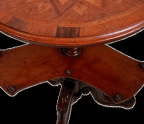Madresfield Court, Worcestershire, part II The home of Lucy and Jonathan Chenevix-Trench
HANGING just inside the front door of Madresfield Court is a framed notice in the form of an exquisitely illuminated manuscript page (Fig 1). It presents erstwhile visitors with a summary of all they needed to know during their stay. The times of prayers and meals take pride of place and, beneath them, are the telegram address and telephone exchange number of the house. Across the top of the intricate foliage border are the figures of saints and the name of the nearest railway station, Malvern Link; at the bottom the arms of Earl Beauchamp. To the sides are four vignettes—a view of the moat, gardens, dining hall and chapel—and portraits of a dog and cat.


The notice is a relic of Madresfield’s busy social round in the years leading up to the First World War, when it was the home of the Liberal politician and discerning patron William Lygon, 7th Earl Beauchamp, who had inherited this ancient family seat in 1891 aged 18. The story of his remarkable life and fall from grace, as well as the links between the house, his children and the novelist Evelyn Waugh, are central to Jane (2008).






